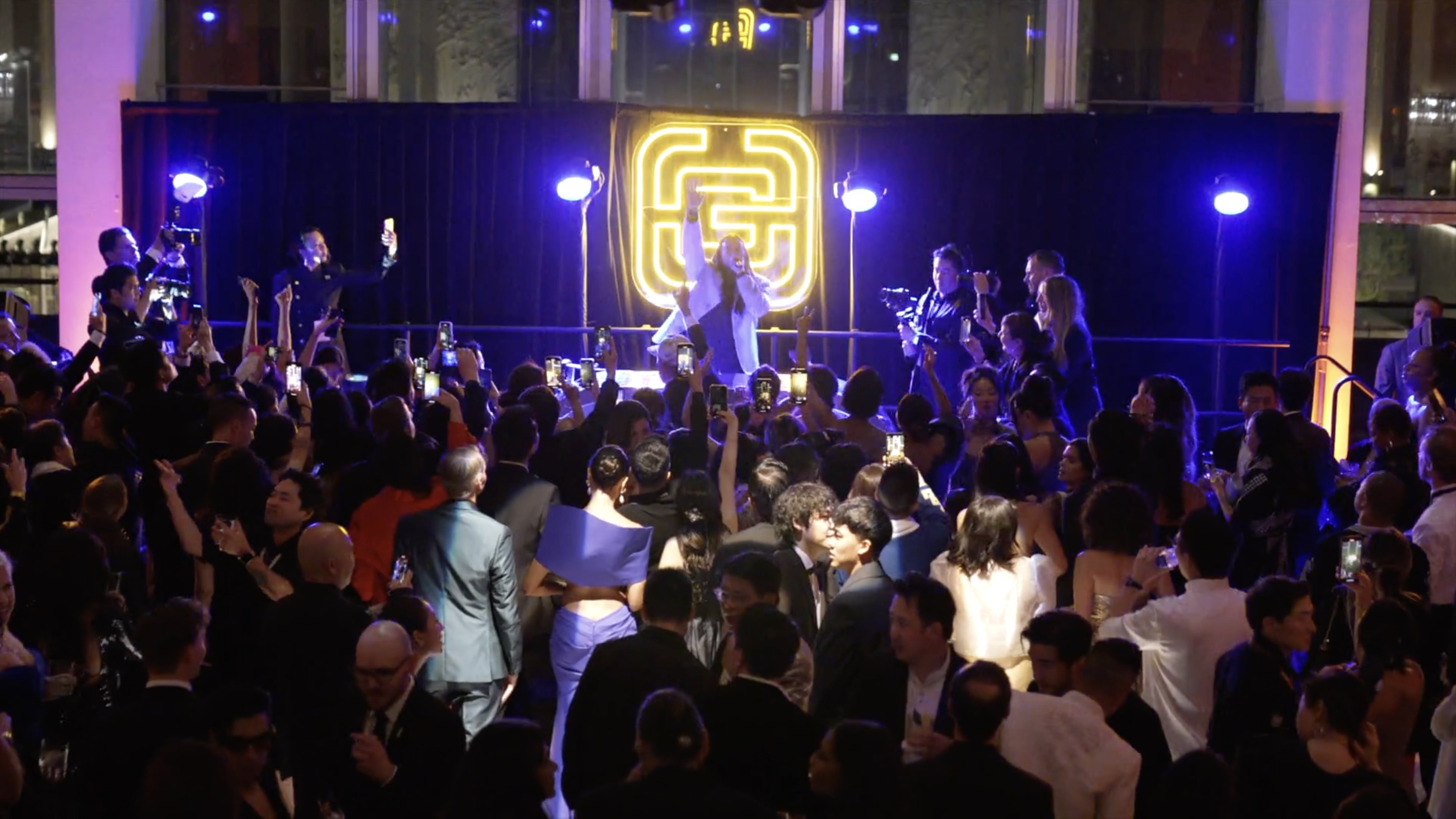Unorthodox Rabbi
As a child, Angela Buchdahl stood out as the lone Asian face in the synagogue and at Jewish camps. Today, she holds the distinction of being the nation’s first Asian American rabbi and is helping to redefine what it means to be Jewish.
by REBECCA U. CHO
On Friday nights at Manhattan’s Central Synagogue, a crowd of 600 gathers for service, voices unifying in centuries-old songs of worship. Leading the attendees in fluent Hebrew, her passion-laden voice soaring to the tops of the temple, is Korean American Angela Buchdahl.
A decade ago, Buchdahl shook up the ranks of Jewish leadership in the U.S. by becoming the country’s first Asian American rabbi. She is “emblematic of the changing face of Judaism,” declared an article in Newsweek, which named the biracial 39-year-old to its 2011 list of 50 Most Influential Rabbis. Not only is she helping to redefine what it means to be Jewish, she is at the forefront of a movement among Reform Jews to inspire social change and push for greater involvement in community organizing.
[ad#336]
Her leadership and vision seem to have connected with Jews around the world. Since her arrival five years ago to the prominent New York synagogue as cantor, or song leader, attendance on Friday nights has doubled. Thousands more worldwide recently listened in on a live web stream of services for the High Holy Days.
Buchdahl believes the booming attendance has a great deal to do with the sense of inclusion that she and other leaders have fostered at the 6,500- member synagogue, which, straining at capacity, started a wait list for membership a few years ago.
“We’re proud of what’s happening here,” Buchdahl says, in an interview by phone.
“They call us a mega-shul,” she jokes, referring to a term for a Jewish house of worship.
The need to connect to a Jewish community is close to Buchdahl’ s heart. Born Angela Lee Warnick to a Korean Buddhist mother and a Jewish American father, she spent much of her childhood with a perpetual sense of being “the only one.”
Buchdahl’ s parents met and married in South Korea, where her father had been visiting as a civil engineer in the ROTC program and her mother was studying English literature at Yonsei University. After the family relocated to the U.S. when Buchdahl was 5 years old, she and her sister grew up as the lone Jewish kids in a large Korean American community in Tacoma, Wash. At the same time, in the synagogue and Jewish camps, she stood out as the only Asian face.
“My ‘Koreanness’ wasn’t anything I could escape because it was on my face,” says Buchdahl. Her younger sister, on the other hand, was often mistaken for being Hispanic.
[ad#336]
For family meals, her mother would serve up a side of kimchi as a complement to Passover matzah, or traditional unleavened bread. A weekend day out could find Buchdahl visiting the Korean mokyoktangs (bath houses) with her mom or on the steps of the synagogue.
Through her mother, Buchdahl developed a deep sense of connection to her Korean identity. A pioneer herself, Buchdahl’s mother helped start the Korean-language program in Washington public schools and was a founding member of the Korean Women’s Association. The statewide association, which was started to support Korean wives of American servicemen, has grown to become one of the largest social services organizations in the state.

Like Buchdahl, her mother was displaced from her native country at age 5, moving to Korea from Japan, where she was born as a result of the Japanese occupation of Korea.
“She’s modeled for me the way you could create a home wherever you are,” Buchdahl says.
And even though her mother was not Jewish or spiritual herself, she and her husband decided to raise their daughters as Jews. Buchdahl’s father was from a Jewish family that had its roots in Tacoma since the early 1900s. This decision instilled a strong sense of spirituality in the future rabbi, who grew up attending synagogue, observing Jewish holidays and celebrating her bat mitzvah.

“When you’re a kid, your parents teach you and exemplify for you your identity. It was very clear that was my religious identity,” she says.
The Jewish community in Tacoma was small, and Buchdahl would emerge, in many situations, as the Jewish representative, despite the irony of not looking Jewish. She would talk about Jewish holidays in schools and, given her singing talent, often served as a song leader in her synagogue.
But she wondered, at one point, if her growing affinity to Judaism somehow took away from her Korean heritage.
“There were times when I felt these identities were competing,” she says. “I felt if I were more involved in my Jewish life, it subsumed my Korean identity in some way.”
Buchdahl also felt pressure growing up to embrace evangelical Christianity.
Her mother’s family was deeply religious, with an aunt’s conversion to Christianity leading to many in the family becoming involved members of the large Korean Christian community in Washington. But Buchdahl felt strongly that Judaism was her religion, while evangelical Christianity was for her aunt, she says.
“It was challenging having my Korean side of the family be evangelical Christians,” Buchdahl says. “My aunt saw it as part of her mission for quite a while to help us see the truth of her Christian faith.”
Meanwhile, from strangers, she often confronted skepticism over her identification as a Jew. Attendance at a Jewish camp in California or even a walk down the street while wearing her Star of David necklace prompted remarks such as, “You’re not Jewish, are you?”
[ad#336]
During a trip to Israel, as part of a youth fellowship Buchdahl won to explore Judaism, the response was even more extreme. Her roommate was an Orthodox Jew, and, in keeping with Orthodox beliefs that the Jewish line traced through the mother, refused to accept Buchdahl as a Jew. In Reform Judaism, Buchdahl’s denomination, a person is Jewish if born from a Jewish father or mother.
“It was incredibly painful and shocking to me because I grew up so established in my own synagogue,” she recalls.
But this trip would prove transformative, laying the groundwork for Buchdahl’s vocation. In the traditional Jewish texts that she studied on the fellowship, she saw a lifetime’s worth of learning that was more exciting to her than anything she had studied in school. And through the rabbis who accompanied her to Israel, she witnessed a lifestyle of teaching and spirituality that she longed to emulate.
At 16 years old, she declared her intent to become a rabbi, an aspiration that drew worry from her mother.
“My mom knew the struggles I had on my trip. She asked, ‘Do you want to set yourself up for not being accepted in the community? It’s one thing to be a Jew; it’s another thing to be accepted as a leader,’” Buchdahl recalls.
But Buchdahl persisted, earning a bachelor’s degree in religious studies from Yale University. During her college years, she also came to realize that she could not separate her Korean and Jewish identities. In fact, she grew to see that her background fit into the narrative of diversity in America’s complex Jewish communities.
[ad#336]
“In reality, every modern Jew has competing identities or multiple identities they’ re negotiating all the time. Maybe you’ re gay and Jewish, live in the South and Jewish, black and Jewish, you’re a feminist and a Jew,” she says.
While a college student, she began working as a song leader at Westchester Reform Temple, just outside of New York City, where she worked for 12 years. At Hebrew Union College-Jewish Institute of Religion in New York City, she was ordained first as a cantor and then as a rabbi in 2001. A one-time weekend gig as a song leader at Central Synagogue later led to her position as cantor.
Today, values instilled in Buchdahl from her Korean heritage, such as a respect for elders and sense of community, guide her work, she says. Under Buchdahl’ s lead, her synagogue has tackled issues such as predatory lending practices and overcrowding in New York’s public schools, an effort that led to the opening of a new public school on the Upper East Side. And she is mobilizing cantors across the U.S. to take the lead in community organizing, a role that typically has been reserved for rabbis.
“My mom really modeled for me [what to do] when you see an issue like this, you can’t stand by and let it continue to happen,” she says.
She sees her bicultural heritage reflected in the diverse Jewish community in New York and at Central Synagogue, which counts at least a dozen Asian-Jewish families. Racial diversity has been on the upswing, with about 20 percent of the 6.1 million Jews in America being of African, Asian, Hispanic, Middle Eastern or mixed-race descent, compared to prior estimates of 10 to 14 percent, according to a 2005 book by the Institute for Jewish and Community Research.
She no longer feels she is “the only one” as she looks out over her synagogue’s multiethnic congregation.
And her mother, who had warned against her early aspirations to become a rabbi, couldn’t be more pleased to have been proven wrong. At Buchdahl’ s installation ceremony as senior cantor at Central Synagogue, her mother wept. Says Buchdahl: “She could not dream I’d become the leader of such a prominent congregation and would have such acceptance from the Jewish community.”







